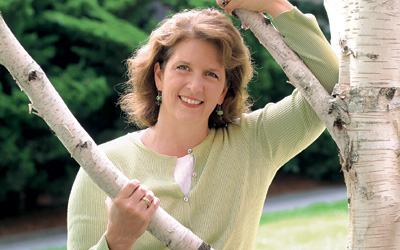 |


|
Summer 2004 | Volume 26, Number 7 | My Response | ||
| Finding God in the Garden By Debra Prinzing í81
Where do we see, hear, feel and inhale Godís presence? Nature is an obvious place ó mountains, oceans and vast plains stretching out as far as the eye can see ó but for many of us, the grand expanse of nature isnít always accessible. And perhaps thatís why we turn to nature on a small scale: Our backyards and our gardens offer telling glimpses of God. At the recent Seattle Pacific University Queen Anne and Magnolia Garden Tour, I spoke about ďfindingĒ God in the garden. Iíll admit that I feel a bit inadequate talking or writing about this subject, since itís so difficult to fully experience Godís unlimited creativity, enormous goodwill and loving generosity in the midst of our fast-paced lives. But mere glimpses of his greatness are, Iíve decided, OK. Thereís as much breathtaking joy in a split-second view of springís first rosebud about to open as there is in sitting on a remote mountaintop gazing at all of Godís creation. In fact, the most surprising sense of awe Iíve experienced happens when Iím tending to my garden. Iíve been treated to many undeserved gifts: seeing a tiny hummingbird, darting from blossom to blossom, sipping at its God-provided nectar source; noticing a perennial bursting into flower, a plant I donít recall ever having planted; or viewing a breathtaking display of the ĎRed Forestí pansy treeís plum-colored leaves glowing as the afternoon sun sets behind it. If someone asks why I love to garden, I quote 20th-century English writer Beverley Nichols. He wrote, ď... Surely, if you are privileged to own a plot of earth, it is your duty, both to God and man, to make it beautiful.Ē I try not to say that I have to ďworkĒ in the garden, however. While there are many necessary and ongoing tasks that garden-makers must undertake in order to care for their plants, to me, these are anything but work. Anyone who has a patch of earth to call his or her own should appreciate this cherished opportunity to observe creation over and over: planting a seed; providing it water, sun and fertilizer; protecting its first young leaves from pests and disease; giving it support and shelter from harsh elements as it matures; and harvesting its blooms or fruit. Then the cycle starts all over again. Itís a terrific lesson in Godís faithfulness to us, as he provides for our needs. The Message, a contemporary translation of the Bible by SPU alumnus Eugene Peterson í54, reminds us in Matthew that ďIf God gives such attention to the appearance of wildflowers ó most of which are never even seen ó donít you think heíll attend to you, take pride in you, do his best for you Ö?Ē Whether we are aware of it or not, I think the pursuit of beauty in the garden is a pursuit to know God better. The very act of gardening gives us hope. It gives us a metaphor for understanding Godís abundance and life-giving restoration. And the act of expressing beauty with each petal, stem and leaf of Godís creation is, for me, an expression of my faith and hope in him. If youíre not a gardener, you can find your own symbol for Godís truths. It may be taking a hike or sailing a boat, or listening to a heart-breaking symphony. But we need to embrace Godís love and slow down to rest in his presence. Even if that means pausing to see Godís greatness in the face of a tiny flower. Having spent all of my childhood listening to my fatherís sermons and my motherís Sunday school lessons, Iíve learned a bit about giving benedictions ó the promise of hope at the end of a church service. I included a gardenerís benediction, of sorts, in my new book, Pacific Northwest Garden Survival Guide. I didnít realize it was a benediction until I saw it in print. Perhaps it will send you off to see the garden in a new way: ďI wish you a wonderful journey that will introduce you to many generous and supportive gardening friends Ö May your gardens be free of slugs; may your soil be rich and organic; and may you enjoy equal parts rain and sunshine.Ē
Debra
Prinzing í81 writes about interior design for The Seattle
Times and gardening topics for national publications. She
is the author of Pacific Northwest Garden Survival Guide (Fulcrum
Books, 2004). She also co-chairs the SPU Queen Anne and Magnolia
Garden Tour Committee. For more information on the topic of
finding God in the garden, she recommends the following two
books: Soul Gardening: Cultivating the Good Life by
Terry Hershey and Gardening Mercies: Finding God in Your
Garden by Laurie Ostby Kehler. |
From the President Equipped for Success Honor Roles Three Faculty Say Good-Bye The 2004 Medallion Awards Attack of the Big-Screen Clones The Heritage Mile
|
